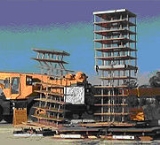
Earthquake engineering
Overview
Seismic loading
Seismic loading is one of the basic concepts of earthquake engineering which means application of an earthquake-generated agitation to a structure...
, thus considered as a subset of both structural
Structural engineering
Structural engineering is a field of engineering dealing with the analysis and design of structures that support or resist loads. Structural engineering is usually considered a specialty within civil engineering, but it can also be studied in its own right....
and geotechnical
Geotechnical engineering
Geotechnical engineering is the branch of civil engineering concerned with the engineering behavior of earth materials. Geotechnical engineering is important in civil engineering, but is also used by military, mining, petroleum, or any other engineering concerned with construction on or in the ground...
engineering. However, the tremendous costs experienced in recent earthquakes have led to an expansion of its scope to encompass disciplines from the wider field of civil engineering
Civil engineering
Civil engineering is a professional engineering discipline that deals with the design, construction, and maintenance of the physical and naturally built environment, including works like roads, bridges, canals, dams, and buildings...
and from the social sciences
Social sciences
Social science is the field of study concerned with society. "Social science" is commonly used as an umbrella term to refer to a plurality of fields outside of the natural sciences usually exclusive of the administrative or managerial sciences...
, especially sociology, political sciences, economics and finance.
The main objectives of earthquake engineering are:
- Foresee the potential consequences of strong earthquakes on urban areas and civil infrastructure.
- Design, construct and maintain structures to perform at earthquake exposure up to the expectations and in compliance with building codeBuilding codeA building code, or building control, is a set of rules that specify the minimum acceptable level of safety for constructed objects such as buildings and nonbuilding structures. The main purpose of building codes are to protect public health, safety and general welfare as they relate to the...
s.
A properly engineered structure
Earthquake engineering structures
Earthquake-resistant structures are designed and constructed to withstand various types of hazardous earthquake exposures at the sites of their particular location....
does not necessarily have to be extremely strong or expensive.
Unanswered Questions
Discussions

